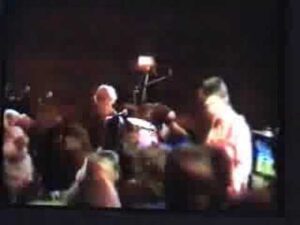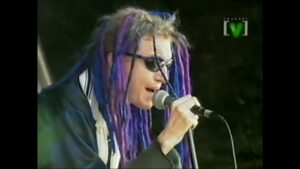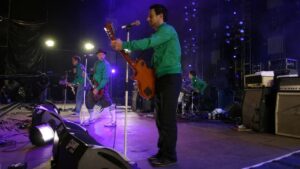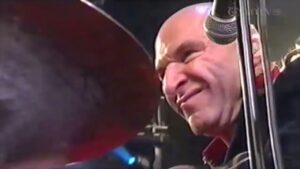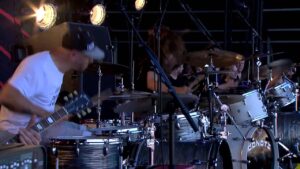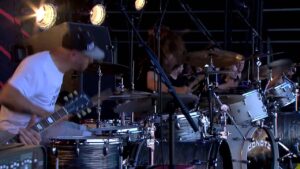Formation & Members
Scarecrows (スケアクローズ) emerged from the vibrant underground punk scene of Tokyo in the late 1990s, a period marked by a fierce and burgeoning interest in hardcore music. The band was formed in 1998 by a group of high school friends who shared a passion for punk rock and a desire to express their angst and rebellion through music. The founding members included vocalist Kenji Nakamura, guitarist Hiroshi Tanaka, bassist Yuki Sato, and drummer Akira Yamamoto. Each member brought unique influences and skills to the table, creating a dynamic and energetic sound that would soon capture the attention of local punk enthusiasts.
Over the years, the lineup evolved slightly, with the most significant change being the addition of guitarist Natsumi Arai in 2003, whose technical prowess and creative input played a crucial role in shaping the band’s sound during their most productive years. Despite the occasional lineup adjustments, the core energy and ethos of Scarecrows remained intact, driven by their commitment to authenticity and raw expression.
Musical Style & Characteristics
Scarecrows carved a niche for themselves with a sound that was both aggressive and melodic, a hallmark of their distinctive approach to punk and hardcore music. Their music was characterized by fast tempos, heavy guitar riffs, and pounding drum beats, blended with melodic undertones that provided a contrast to the intensity of their sound. Kenji Nakamura’s vocals were a defining feature, delivering lyrics with a raw intensity that resonated with the disillusionment and frustration of their generation.
Lyrically, Scarecrows tackled themes of alienation, societal pressure, and personal struggles, often reflecting the challenges faced by young people in an increasingly complex world. Their songs were anthemic, with powerful choruses that invited sing-alongs and mosh pits at their live shows. The band drew influence from both Western punk pioneers and local Japanese acts, creating a fusion that was uniquely their own.
Key Works & Discography
The discography of Scarecrows is a testament to their evolution and impact on the punk scene. Their debut EP, “Broken Wings” (1999), introduced their raw energy and set the stage for their subsequent releases. The EP was well-received in underground circles, earning them a loyal following.
In 2001, they released their first full-length album, “Urban Decay,” which solidified their place in the punk scene. The album featured standout tracks like “Concrete Jungle” and “Lost Generation,” which became anthems for disaffected youth. The success of “Urban Decay” was followed by “Echoes of Anarchy” (2004), an album that expanded their sound with more complex arrangements and deeper lyrical content.
The band’s third album, “Resonance” (2007), marked a pinnacle in their career, showcasing a matured sound with tracks like “Silent Scream” and “Fading Shadows.” This album received critical acclaim and broadened their reach beyond Japan, attracting international attention.
Influence on Other Bands/Scenes
Scarecrows’ influence extended beyond their immediate fan base, impacting the broader punk and hardcore scenes both in Japan and internationally. Their ability to merge melodic elements with hardcore intensity inspired a wave of bands seeking to emulate their sound. Many contemporary Japanese punk bands cite Scarecrows as a significant influence, noting their innovative approach and uncompromising spirit.
Internationally, Scarecrows played a role in introducing Western audiences to the Japanese punk scene, serving as a bridge between cultures. Their participation in international punk festivals and tours helped to raise the profile of Japanese punk music, encouraging cross-cultural collaborations and exchanges. The band’s legacy is evident in the continued popularity of melodic hardcore and punk bands that draw from their pioneering style.
Breakups or Reunions
Despite their success, Scarecrows faced internal challenges that eventually led to their breakup in 2010. Creative differences and the pressures of maintaining their rigorous touring schedule contributed to tensions within the band. The announcement of their disbandment was met with disappointment from fans, but it was also understood as a necessary step for the members to pursue personal growth and new projects.
In 2018, Scarecrows surprised fans with a reunion tour to celebrate the 20th anniversary of their formation. The tour was a resounding success, rekindling the passion of their original fan base and introducing their music to a new generation. The chemistry and energy that had defined their early years were still very much alive, proving that the band’s legacy was enduring and impactful.
Current Reputation & Legacy
Today, Scarecrows are regarded as pioneers of the Japanese punk and hardcore scenes, with a legacy that continues to influence new generations of musicians. Their music is celebrated for its authenticity and emotional depth, qualities that resonate with fans across the globe. The band’s ability to capture the zeitgeist of their era while maintaining a universal appeal has ensured their place in the annals of punk history.
Their albums remain staples in the collections of punk enthusiasts, and their songs are frequently covered by emerging bands. The influence of Scarecrows is evident in the thriving punk scene in Japan, where their spirit of rebellion and innovation lives on.
Conclusion
Scarecrows (スケアクローズ) may have emerged from the underground, but their impact has been anything but obscure. From their formation in the vibrant Tokyo punk scene to their status as influential pioneers of hardcore music, the band’s journey is a testament to the power of music as a vehicle for expression and change. Their raw energy, melodic sensibility, and fearless exploration of personal and societal themes have left an indelible mark on punk music.
As a band that bridged cultures and inspired countless others, Scarecrows’ legacy continues to thrive. Whether through their powerful discography, their influence on fellow musicians, or their memorable reunion, Scarecrows remain a symbol of the enduring spirit of punk rock. Their story is a reminder of the transformative power of music and its ability to unite, inspire, and challenge the status quo.




